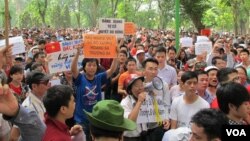HANOI —
Hundreds of people across Vietnam took part in protests Sunday morning days after Vietnamese and Chinese vessels were reported sparring near a Chinese oil rig in disputed waters in the South China Sea.
Hundreds of people across Vietnam took part in anti-China demonstrations Sunday to protest China’s deployment of an oil rig near the Paracel islands, which both countries claim.
In a highly unusual move, the protests were covered in state-run media. Such protests are usually strictly controlled by police and participants are often prevented from attending.
In Hanoi around 500 people gathered in a park opposite the Chinese embassy - the biggest anti-China protest to take place here for many years.
Some banners read “China back off from Vietnamese waters,” and “the Paracel and Spratly islands belong to Vietnam”. One poster, which was perhaps telling of the mood read: “We entirely trust the Party, the government and the People’s Army.”
Earlier this week Vietnamese and Chinese vessels clashed near a Chinese state-owned oil rig in disputed waters in the South China Sea. Vietnam accused the Chinese ships of repeatedly ramming the Vietnamese ships and using water cannon, injuring six crewmen. Beijing said Vietnam continues to send ships to the area, threatening Chinese personnel.
One protester, Thanh, said she believes many people were worried about how the situation might escalate.
"If the war really happens between Vietnam and China it will be very bad for the people. My family live in Cao Bang, and before in 1979 the war happened between China. All houses were destroyed. We live really close to the China border so we are really afraid about this," she said.
Although the road to the Chinese embassy building itself was blocked by police, the crowd had an uninterrupted view of the gates. Several regular protest participants said it was the first time they had been allowed to protest so close to the Chinese embassy.
However, not everyone was taking their freedom to protest for granted.
Huu Ngoc Lam is a regular participant. He said before he joined the gathering, he told his wife to take his motorbike home if he was detained by police.
He said even though he was nearly 70 years old, he was a patriot and was not scared of the police, eliciting applause from the crowd.
The confrontation over the islands, which Chinese forces seized from then South Vietnam in 1974, has raised fears of growing tensions between the two countries.
During a visit to Hanoi Thursday, U.S. Assistant Secretary of State Daniel Russel urged both sides to "refrain from unilateral actions”.
Foreign ministers from the 10-member Association of Southeast Asian Nations issued a statement Saturday ahead of Sunday’s ASEAN summit expressing concern and urging restraint by all parties.
Beijing claims nearly all of the South China Sea, which contains key shipping lanes and is believed to be rich in oil and gas deposits.
Vietnam, Malaysia, the Philippines and Brunei have competing claims to different areas of the sea, as does Taiwan.
Hundreds of people across Vietnam took part in anti-China demonstrations Sunday to protest China’s deployment of an oil rig near the Paracel islands, which both countries claim.
In a highly unusual move, the protests were covered in state-run media. Such protests are usually strictly controlled by police and participants are often prevented from attending.
In Hanoi around 500 people gathered in a park opposite the Chinese embassy - the biggest anti-China protest to take place here for many years.
Some banners read “China back off from Vietnamese waters,” and “the Paracel and Spratly islands belong to Vietnam”. One poster, which was perhaps telling of the mood read: “We entirely trust the Party, the government and the People’s Army.”
Earlier this week Vietnamese and Chinese vessels clashed near a Chinese state-owned oil rig in disputed waters in the South China Sea. Vietnam accused the Chinese ships of repeatedly ramming the Vietnamese ships and using water cannon, injuring six crewmen. Beijing said Vietnam continues to send ships to the area, threatening Chinese personnel.
One protester, Thanh, said she believes many people were worried about how the situation might escalate.
"If the war really happens between Vietnam and China it will be very bad for the people. My family live in Cao Bang, and before in 1979 the war happened between China. All houses were destroyed. We live really close to the China border so we are really afraid about this," she said.
Although the road to the Chinese embassy building itself was blocked by police, the crowd had an uninterrupted view of the gates. Several regular protest participants said it was the first time they had been allowed to protest so close to the Chinese embassy.
However, not everyone was taking their freedom to protest for granted.
Huu Ngoc Lam is a regular participant. He said before he joined the gathering, he told his wife to take his motorbike home if he was detained by police.
He said even though he was nearly 70 years old, he was a patriot and was not scared of the police, eliciting applause from the crowd.
The confrontation over the islands, which Chinese forces seized from then South Vietnam in 1974, has raised fears of growing tensions between the two countries.
During a visit to Hanoi Thursday, U.S. Assistant Secretary of State Daniel Russel urged both sides to "refrain from unilateral actions”.
Foreign ministers from the 10-member Association of Southeast Asian Nations issued a statement Saturday ahead of Sunday’s ASEAN summit expressing concern and urging restraint by all parties.
Beijing claims nearly all of the South China Sea, which contains key shipping lanes and is believed to be rich in oil and gas deposits.
Vietnam, Malaysia, the Philippines and Brunei have competing claims to different areas of the sea, as does Taiwan.




